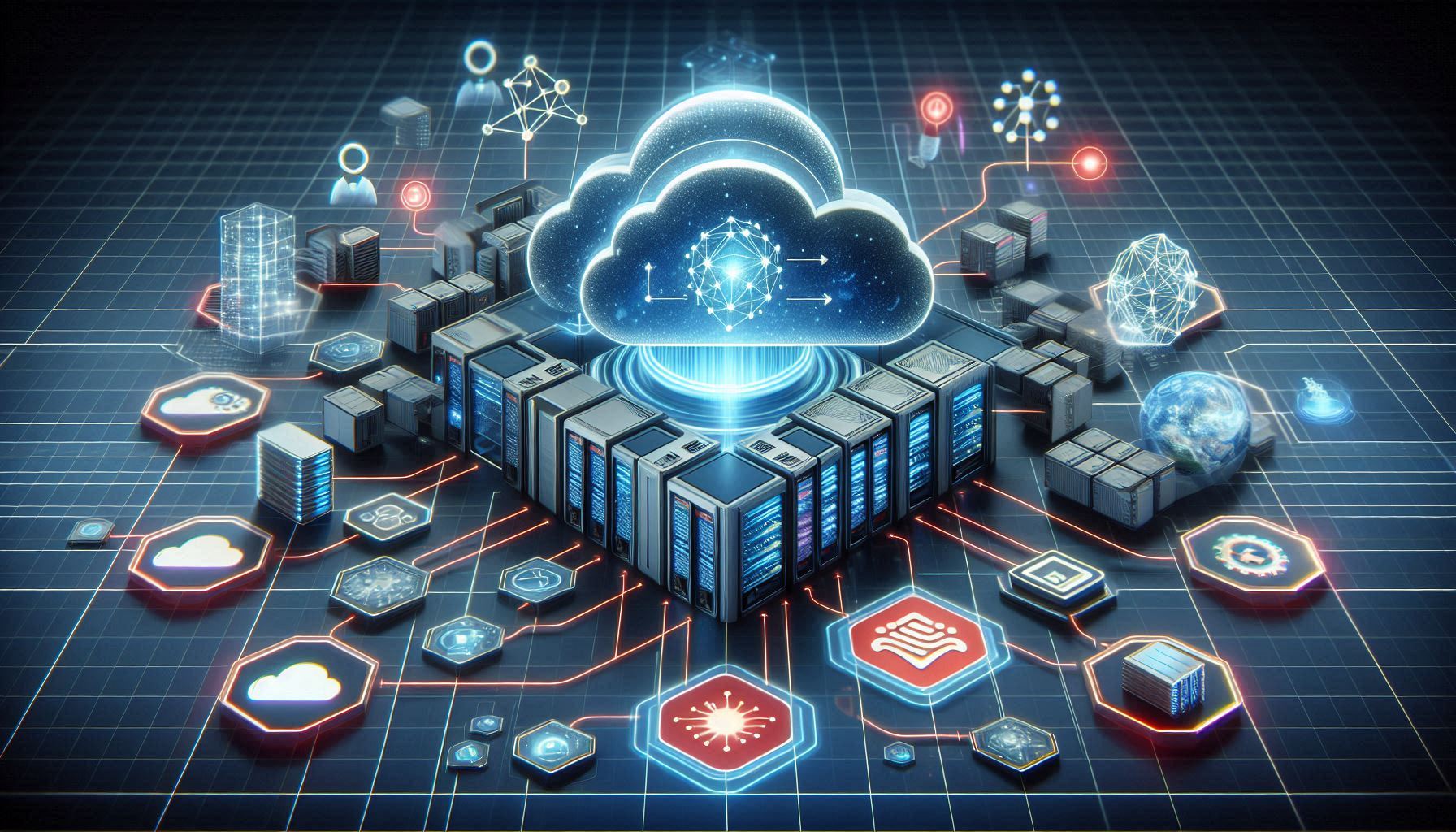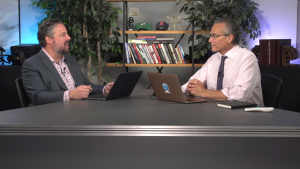 CLOUD
CLOUD
 CLOUD
CLOUD
 CLOUD
CLOUD
Container technologies are driving enterprise innovation as companies shift from traditional virtualization to more scalable, container-based architectures.
The growing adoption of AI and machine learning is pushing IT leaders to embrace cloud-native technologies that offer greater flexibility and efficiency. As organizations move away from legacy models and adapt to future AI workloads, they find new opportunities to improve operational performance and streamline infrastructure management.
“With the complexity out there right now between the virtualization landscape and the pace of AI, there’s more pressure than ever to keep pace and invest in solutions that keep [a company’s] path forward in the future in mind,” said Alyson Langon, director of product marketing for multicloud and HCI at Dell Technologies Inc., during an interview with theCUBE. “A good example of this is container adoption.”
During the “Build Now and for the Future With Dell & Red Hat” event, broadcast on theCUBE, SiliconANGLE Media’s livestreaming studio, Rob Strechay, principal analyst at theCUBE Research, talked with Langon, Stu Miniman, senior director of market insights, hybrid platforms at Red Hat Inc., and Dave Vellante, chief analyst at theCUBE Research. They discussed how combining cloud-native applications, virtualization and AI into a single platform simplifies enterprise IT operations and hybrid cloud environments. (Disclosure below.)

TheCUBE Research’s Rob Strechay and Dave Vellante talk about how Dell’s APEX Cloud Platform, combined with Red Hat OpenShift, helps enterprises manage cloud-native and AI workloads.
Here are three key insights you may have missed from the event:
As companies embrace AI and machine learning, there’s a growing preference for cloud-native containerized applications over traditional virtualization, according to Strechay during the event. This change improves flexibility and scalability, particularly when handling modern AI workloads. The combination of Red Hat OpenShift and Dell’s APEX Cloud Platform enhances the transition by enabling efficient management of containerized AI models and improved performance in complex environments, Strechay pointed out.
“A lot of what is being built from an AI and machine learning perspective is actually in containers,” he said. “What they’re doing for ease of use and being able to bring the portability of these models [is] containerizing those so that they can actually do governance on some of those models.”
Containers are essential in simplifying the infrastructure needed for AI and virtualization, according to Vellante. Enterprises need a flexible system that can simultaneously support real-time data processing and manage the increasing complexity of their IT environments. Dell’s collaboration with Red Hat aims to tackle these challenges by focusing on performance and ease of deployment.
“It’s safe to say that the two topics that are very hot in the community are AI infrastructure and, of course, virtualization,” Vellante said. “Containers is the simplifying infrastructure.”
Here’s the link to the complete video discussion between Rob Strechay and Dave Vellante:
Managing virtual machines and containerized applications becomes increasingly essential as enterprises continue integrating AI into their operations, according to Langon. To address this growing need, Dell’s APEX Cloud Platform for Red Hat OpenShift offers a unified cloud operating model that supports both traditional virtualization and modern containerization. This solution provides the necessary flexibility and scalability to optimize enterprise IT environments and adapt to changing demands effectively.
“The APEX Cloud Platform for Red Hat OpenShift was built with simplicity and ease of use in mind,” Langon said. “Being able to run OpenShift on-prem and getting cloud-like agility and efficiency on bare metal, with built-in software automation and full-stack lifecycle management, provides you the flexibility and choice to set you up for running your applications today and into the future.”
By combining cloud-like agility and on-premises control, companies can adapt their workloads to meet changing needs, according to Langon, who stressed the importance of this balance as organizations adopt emerging technologies such as gen AI. Dell’s APEX Platform addresses these needs by offering built-in automation and lifecycle management, simplifying the deployment and maintenance of hybrid environments.
“With the complexity out there right now between the virtualization landscape and the pace of AI, there’s more pressure than ever to keep pace and invest in solutions that keep [a company’s] path forward in the future in mind,” Langon said. “A good example of this is container adoption.”

Dell’s Alyson Langon and Red Hat’s Stu Miniman talk with theCUBE Research’s Rob Strechay about how cloud-native applications, virtualization and AI drive enterprise efficiency in Dell and Red Hat’s latest innovation.
Red Hat’s OpenShift platform has evolved to meet the growing demand for containerization while incorporating virtual machines into modern architectures, Miniman told theCUBE. Through its partnership with Dell, Red Hat has simplified IT operations by allowing VMs to coexist alongside containerized workloads within the same environment. This convergence eliminates the need for separate infrastructures and enables enterprises to manage both traditional and cloud-native applications efficiently.
“The big change here is how do we bring virtual machines into this environment?” Miniman asked. “Now we can bring virtual machines into that modern architecture with OpenShift Virtualization, and now that’s part of the Dell APEX for OpenShift solution.”
This integrated approach allows organizations to maintain their legacy virtual machines while taking advantage of the agility of container technologies, Miniman added. As enterprises navigate the complexities of AI and container technologies, the ability to manage both within a unified system is crucial for maintaining operational efficiency and reducing IT overhead. Red Hat’s OpenShift Virtualization helps provide a seamless transition for businesses looking to modernize their infrastructures.
“When we launched this update to the partnership with Dell, we started with that containerization, because while we’ve been on this journey with OpenShift for over a decade … it’s always, ‘How do I make that simpler?’” Miniman said. “Dell has such a great track record at building those solutions.”
Here’s the complete video interview with Stu Miniman and Alyson Langon:
To watch more of theCUBE’s coverage of this event, here’s our complete event video playlist:
(* Disclosure: TheCUBE is a paid media partner for the “Build Now and for the Future With Dell & Red Hat” event. Neither Dell Technologies Inc., the sponsor of theCUBE’s event coverage, nor other sponsors have editorial control over content on theCUBE or SiliconANGLE.)
Support our mission to keep content open and free by engaging with theCUBE community. Join theCUBE’s Alumni Trust Network, where technology leaders connect, share intelligence and create opportunities.
Founded by tech visionaries John Furrier and Dave Vellante, SiliconANGLE Media has built a dynamic ecosystem of industry-leading digital media brands that reach 15+ million elite tech professionals. Our new proprietary theCUBE AI Video Cloud is breaking ground in audience interaction, leveraging theCUBEai.com neural network to help technology companies make data-driven decisions and stay at the forefront of industry conversations.